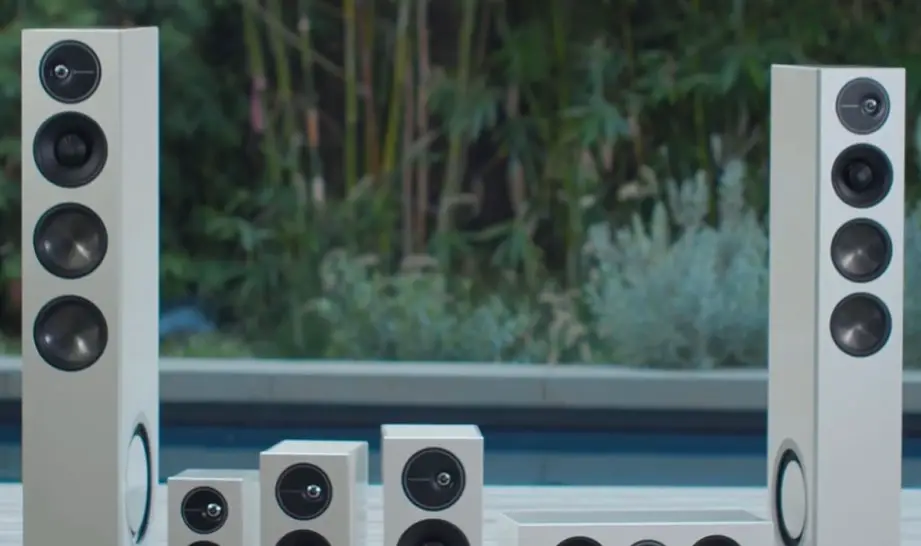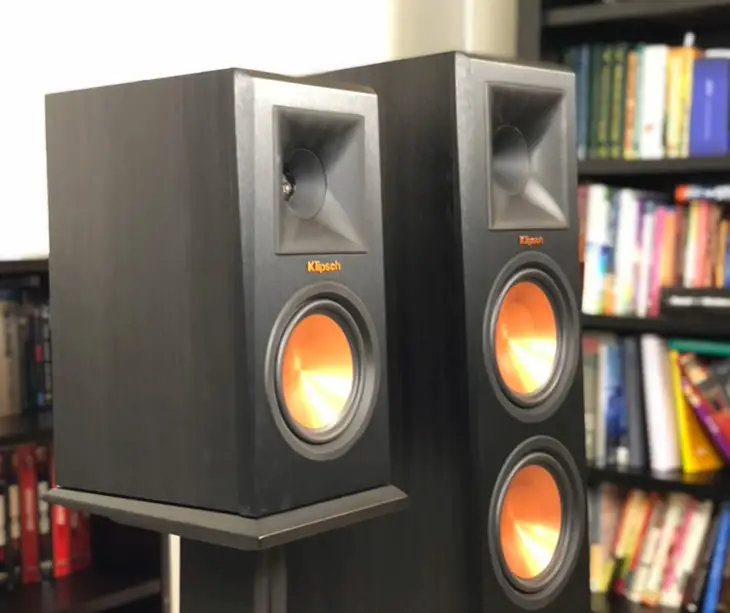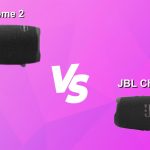So, you went to this amazing store to buy a suitable speaker for your home theater. However, you are stuck between two choices: Bookshelf VS Floorstanding Speakers!
Two speakers, both eager to fill your room with sound. One is tall and proud, standing tall like a rockstar, ready to perform. The other is compact and cute, fitting snugly on a bookshelf like a well-loved novel.
Welcome to the world of Floorstanding vs. Bookshelf speakers, where size does matter, but so does performance!
So, how do you know which one to choose?
Well, ask the magical mirror if you have one!
But if you don’t have it, you need to sit tight for the next ten minutes to come out of this Bookshelf VS Floorstanding speaker combat alive!
Bookshelf Speakers

So, Ladies and Gentlemen, let me introduce you to the most charismatic and charming duo in the audio world – the Bookshelf Speakers! These tiny wonders pack a punch and are ready to take your listening experience to the next level! Imagine a book that could tell you a story and sing and dance along with you! These speakers do so with style and humor.
Here’s what these amazing speakers are famous for.
With their compact and convenient size, these audio speakers are designed to be placed on a bookshelf or other elevated surface. For their small size, the bookshelf speakers can be easily integrated into a home entertainment system or used as standalone speakers and are loved by audiophiles for the high-quality music they produce.
Amazing feature, isn’t it? Now this allows you to set up your home theater even in smaller spaces.
So, if you’re looking to create a home theater system or simply enjoy listening to music in your living room, bookshelf speakers are a great choice for those who value quality sound and convenient placement.
Floorstanding Speakers

Now, let’s find out about the competitor! The floor standing speakers.
Floorstanding speakers, also known as tower speakers, are large speakers that sit directly on the floor. These speakers are designed to provide a high-quality sound experience in home theaters. They are larger than bookshelf speakers, making them more suitable for large rooms.
So, if your home theater is in a large space, Floorstanding speakers are your perfect choice.
They come with multiple drivers that allow for a more dynamic sound, with separate units for different frequencies, such as bass, mids, and highs.
Now that you have a general idea about these speakers let’s enter the End Game of Bookshelf VS floorstanding speakers and find out which one is better.
The Combat Begins: Bookshelf VS Floorstanding Speakers
Size and Space:
Floorstanding speakers are typically larger and more imposing than bookshelf speakers. They take up more space, are designed for larger rooms, and are typically up to 3 feet tall. On the other hand, bookshelf speakers are more compact and roughly 1 foot tall, so they can fit into smaller spaces such as a bookshelf, desktop, or stand.
The larger size of the floorstanding speakers gives it an edge to have more drivers, improving sound quality. Bookshelf speakers, because of the small sizer, contain smaller drivers and are less powerful than floorstanding speakers, making them better suited for use in smaller rooms or for background music.
Bass Response:
Now if you don’t know what’s Bass Response, everything would sound French to you until you know about this term.
So, what’s this French, Amigo?
Bass response refers to how efficiently your speakers can handle or deliver the low-frequency range audios.
Now, as Floorstanding speakers have larger drivers (tweeters, mid-range drivers, and woofers), they produce more robust bass compared to bookshelf speakers. Floorstanding speakers can often reproduce lower frequencies without requiring a subwoofer, whereas bookshelf speakers may require one for optimal bass performance. Furthermore, floorstanding speakers can produce deeper and more impactful bass due to their larger size and weight.
On the other hand, bookshelf speakers are more compact and do not have as much room for larger bass drivers, resulting in a weaker bass response compared to floorstanding speakers. However, bookshelf speakers can still produce decent bass and are often paired with a subwoofer to enhance their bass response.
Power Handling:
To find the winner of this bookshelf VS Floorstanding combat, you might want to know the power handling capability of these two. It’ll help make your decision easier.
Floorstanding speakers typically have a higher power handling capability than bookshelf speakers due to their larger size and more robust construction. Floorstanding speakers typically have more drivers and larger bass reflex ports, allowing them to handle more power and produce more volume.
A typical Floorstanding speaker can handle between 100-400 watts RMS, while a bookshelf speaker may handle anywhere from 20-100 watts RMS. The same power handling capability of a speaker will depend on its design and the materials used in its construction.
In addition, it is essential to match your speakers’ power handling capability with your amplifier’s power output. If the amplifier provides too much power for the speakers, it can cause distortion and even damage the speakers.
Sound Quality:
Well, isn’t all of this war because of the sound Quality?
Yes, it is. So, let’s see which one goes for “Winner Winner, Chicken Dinner.”
Hold on!
It’s not that simple!
The sound quality of the speakers is more complicated as it seems to be. It also depends on many factors, including the cabinet, crossover components, drivers, and specific speakers model, which makes brings both of these on the same boat, always fighting for the winning seat.
In general, we say that the sound quality of Floorstanding speakers is better than bookshelf speakers, with a more open, dynamic, immersive, and spacious sound. Floorstanding speakers are better at creating a full, three-dimensional soundstage and filling a room with sound because they have more drivers than Bookshelf speakers. However, it’s not true in all cases; the quality of drivers, crossover components, speaker model, and cabinet may effect the quality of a Floorstanding speaker’s sound.
Similarly, the Bookshelf speakers have a compact size, which reduces the space for enough drivers, which affects the audio quality. However, they can still produce good sound quality, especially if they are paired with a subwoofer.
So, to sum up!
There’s no winner in the sound quality; cause the quality of sound for each type of speaker may vary depending on the factors mentioned.
Price:
Floorstanding speakers are generally more expensive than bookshelf speakers due to their larger size, higher power handling, and better sound quality. Bookshelf speakers are more affordable, making them a popular choice for those on a budget or those with limited space. However, the price of the speakers also depends on many other factors such as the model, the Bookshelf speakers may sometimes cost you more than a common/beginner level floorstanding speaker because of the manufacturing company, the speakers model, as well as the materials used in its construction.
Furthermore, although most Floorstanding speakers are expensive, yet, some models of these speakers might be equally priced as a Bookshelf speakers.
So, all in all, in some cases, the Floorstanding speakers may cost more than the bookshelf speakers; however, this can change depending on the quality, model, brand, and material of the speakers.
Flexibility:
So, what now are speakers taking gymnastic classes for flexibility?
Absolutely not!
The flexibility of the speaker is determined by how efficient or versatile a speaker is for use.
Bookshelf speakers are more versatile than Floorstanding speakers, as they can be easily placed on stands, shelves, or even mounted on the wall. Floorstanding speakers are more limited in their placement options and are designed to be placed on the floor.
Now you know the difference between the two and can easily find out which one’s the best; however, the best one might not be appropriate for your home theater.
Yes, that’s right!
Choosing a speaker for your home theater is more about the speaker’s suitability for your home theater.
So, here’s what you need to consider for choosing the appropriate one for your home theater.
Things to consider while choosing a speaker for your home theater
Check the Room Size:
Bookshelf speakers are more compact and can easily fit on a bookshelf, making them suitable for small spaces. Floorstanding speakers, on the other hand, are larger and take up more space.
So, if you have a smaller room, you must choose Bookshelf speakers paired with a subwoofer to handle the low-range frequencies. For larger rooms, Floorstanding speakers are your perfect partner.
Mind your budget:
You won’t want to buy something that costs you an arm and a leg and leaves you broke for the rest of the month, which is why you need to keep the cost of each one of the speakers in mind for choosing an appropriate one for yourself.
A typical Floorstanding speaker would start from $500, whereas a bookshelf speaker might start from $150 to $250. So, if you’re tight on budget, you should wait a little longer or choose a high-quality Bookshelf speaker for some time.
Keep an eye for Compatibility:
Whatever you’re purchasing has to be compatible with your home theater equipment. You would not like a surprise entry of incompatibility of your speakers with the rest of the equipment.
Sound quality:
Floorstanding speakers produce better audio because of the increased number of drivers compared to Bookshelf speakers. So, if you’re looking for quality audio, you may choose floorstanding speakers if your room is large enough to accommodate them.
In Conclusion:
And so, the great battle between the bookshelf and floorstanding speakers has finally come to an end. The bookshelf speakers were brave, but ultimately, they just couldn’t handle the bass. The floorstanding speakers came out on top, proving that bigger is better, especially when it comes to sound quality. But don’t worry bookshelf speakers; you’ll always have a place in our hearts… and on our bookshelves.

I’m Shaun Conroy, an audiophile & founder of HiFi Audios. Holding a Bachelor’s in Sound Engineering, I bring deep expertise in audio devices and offer insights & recommendations to fellow enthusiasts.






